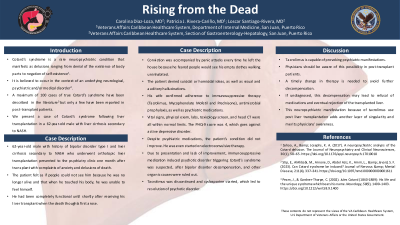Tuesday Poster Session
Category: Liver
P4022 - Rising From the Dead
Tuesday, October 24, 2023
10:30 AM - 4:00 PM PT
Location: Exhibit Hall

Has Audio
- CD
Carolina S. Diaz-Loza, MD
VA Caribbean Healthcare System
San Juan, PR
Presenting Author(s)
Carolina S. Diaz- Loza, MD1, Patricia Rivera, MD1, Loscar Santiago-Rivera, MD2
1VA Caribbean Healthcare System, San Juan, Puerto Rico; 2San Juan, Puerto Rico
Introduction: Cotard’s syndrome, is a rare neuropsychiatric condition that manifests as delusions ranging from denial of the existence of body parts to negation of self-existence1. We present a case of Cotard’s syndrome following liver transplantation in a 62-year-old male with liver cirrhosis secondary to NASH.
Case Description/Methods: A 62-year-old male with past medical history of bipolar disorder type I and liver cirrhosis secondary to NASH who underwent orthotopic liver transplantation presented to the psychiatry clinic one month after transplant with a chief complaint of anxiety and delusions of death. The patient explained that he felt as if people could not see him because he was no longer alive and that when he touched his body he was unable to feel himself. He had been completely functional until shortly after receiving his liver transplant when the death thoughts first arose. This conviction was accompanied by panic attacks every time he left the house because he feared people would see his empty clothes walking uninhabited. The patient denied suicidal or homicidal ideas, as well as visual and auditory hallucinations. His wife confirmed adherence to immunosuppressive therapy consistent of Tacrolimus, Mycophenolate Mofetil and Prednisone, antimicrobial prophylaxis, as well as psychiatric medications. Vital signs, physical exam, labs, toxicology screen, and head CT were all within normal limits. Despite psychiatric medications, the patient’s condition did not improve. The patient was even started on electroconvulsive therapy. Due to patient’s presentation and lack of improvement, immunosuppressive medication induced psychotic disorder triggering Cotard’s syndrome was suspected. Tacrolimus was discontinued and cyclosporine started as per Hepatologist’s recommendations, which led to resolution of psychotic disorder.
Discussion: This case serves to illustrate the extent to which tacrolimus is capable of provoking psychiatric manifestations and the importance of awareness of this possibility in post-transplant patients. A timely change in therapy is needed to avoid further decompensation. If undiagnosed, this decompensation may lead to refusal of all medications and eventual rejection of the transplanted liver. Few cases of post- transplant Cotard’s Syndrome have been described. Not only is the syndrome exceedingly rare, but this particular neuropsychiatric manifestation as a consequence of tacrolimus use post liver transplantation adds another layer of singularity and merits further investigation.
Disclosures:
Carolina S. Diaz- Loza, MD1, Patricia Rivera, MD1, Loscar Santiago-Rivera, MD2. P4022 - Rising From the Dead, ACG 2023 Annual Scientific Meeting Abstracts. Vancouver, BC, Canada: American College of Gastroenterology.
1VA Caribbean Healthcare System, San Juan, Puerto Rico; 2San Juan, Puerto Rico
Introduction: Cotard’s syndrome, is a rare neuropsychiatric condition that manifests as delusions ranging from denial of the existence of body parts to negation of self-existence1. We present a case of Cotard’s syndrome following liver transplantation in a 62-year-old male with liver cirrhosis secondary to NASH.
Case Description/Methods: A 62-year-old male with past medical history of bipolar disorder type I and liver cirrhosis secondary to NASH who underwent orthotopic liver transplantation presented to the psychiatry clinic one month after transplant with a chief complaint of anxiety and delusions of death. The patient explained that he felt as if people could not see him because he was no longer alive and that when he touched his body he was unable to feel himself. He had been completely functional until shortly after receiving his liver transplant when the death thoughts first arose. This conviction was accompanied by panic attacks every time he left the house because he feared people would see his empty clothes walking uninhabited. The patient denied suicidal or homicidal ideas, as well as visual and auditory hallucinations. His wife confirmed adherence to immunosuppressive therapy consistent of Tacrolimus, Mycophenolate Mofetil and Prednisone, antimicrobial prophylaxis, as well as psychiatric medications. Vital signs, physical exam, labs, toxicology screen, and head CT were all within normal limits. Despite psychiatric medications, the patient’s condition did not improve. The patient was even started on electroconvulsive therapy. Due to patient’s presentation and lack of improvement, immunosuppressive medication induced psychotic disorder triggering Cotard’s syndrome was suspected. Tacrolimus was discontinued and cyclosporine started as per Hepatologist’s recommendations, which led to resolution of psychotic disorder.
Discussion: This case serves to illustrate the extent to which tacrolimus is capable of provoking psychiatric manifestations and the importance of awareness of this possibility in post-transplant patients. A timely change in therapy is needed to avoid further decompensation. If undiagnosed, this decompensation may lead to refusal of all medications and eventual rejection of the transplanted liver. Few cases of post- transplant Cotard’s Syndrome have been described. Not only is the syndrome exceedingly rare, but this particular neuropsychiatric manifestation as a consequence of tacrolimus use post liver transplantation adds another layer of singularity and merits further investigation.
Disclosures:
Carolina Diaz- Loza indicated no relevant financial relationships.
Patricia Rivera indicated no relevant financial relationships.
Loscar Santiago-Rivera indicated no relevant financial relationships.
Carolina S. Diaz- Loza, MD1, Patricia Rivera, MD1, Loscar Santiago-Rivera, MD2. P4022 - Rising From the Dead, ACG 2023 Annual Scientific Meeting Abstracts. Vancouver, BC, Canada: American College of Gastroenterology.
